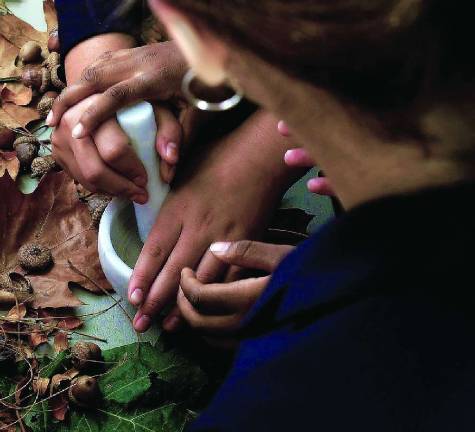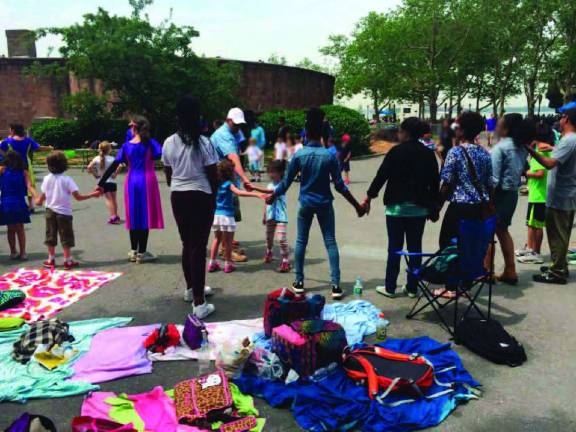Sowing the seeds of diversity, above and below ground


The one day Americans take pause and express gratitude for the food on their plates is rapidly approaching. The other 364 days of the year, however, the origins of our abundance and the rituals surrounding that which sustains us are not necessarily top of mind.
Not so for Dr. Pamela Proscia, an adjunct assistant professor at Hunter College/CUNY and the director of the Musical Seeds Project: Intersections of Ecology, Music, and Dance. Since 2015, Proscia has spearheaded an annual autumn harvest gathering, where participants with origins from across the globe come to celebrate the ethnic and horticultural diversity of our city, and the earth beneath it.
This year’s gathering took place on Nov. 3 at the Corpus Christi School on West 121 Street (the Sakura Park location was rained out) and was, in part, a lesson in the myriad ways people celebrate the sacred acts of planting and harvesting. Though some New Yorkers might think of “horticultural diversity” as the ability to access various vegetarian cuisines all within a few block radius, Proscia’s definition extends further, both in time and space. The Musical Seeds Project was inspired by her dissertation research on the teaching and learning of Mexican folkloric music and dance in pre-conquest Mexico.
“I started to look at, and then piece together, that so many cultures at planting time and harvest time have different celebrations [that] brought people together through music and dance,” says Proscia.
Around the same time, a conversation with a friend about concern for the environment got Proscia thinking about the fact that despite the “re-greening” of parts of the earth, many people aren’t really in tune with the origins of their food, or aware of the ancestral knowledge about planting and harvesting passed down for generations.
“Even in the work I’ve done over the years with children, they didn’t know where food came from ... it was just something you went to the store and bought,” says Proscia. “We talked about how we can really bring back [horticultural] diversity in general, and how important it is to care for life on the planet in general. Musical Seeds came out of those concerns.”
The first harvest gathering, held in Battery Park, showcased cross-cultural parallels. Participants from the Jewish community attended, including an agronomist who planted wheat — one of two grains on the biblical list of the seven species, and a crucial part of the Jewish holiday of Sukkot, celebrating the gathering of the harvest. The wheat was then transferred and planted in Battery Park, and accompanied by an Israeli folk dance. Members of the Ramapough Lenape Nation brought sassafras, participants with Scots Gaelic heritage brought heather plants and members of the Tibetan community contributed sage and mint. From across the globe, plants that were “essential for the lineage and survival” of different peoples were rooted in Manhattan. The 75-100 participants, many of them children, danced, played music and planted with the Statue of Liberty in view.
“We’ve worked now with hundreds of children who have been allowed to come into a space where there are diverse people sharing their cultural knowledge of music and dance, sharing the cultural practices of planting and harvesting. We’re looking to expand our work with schools that would like to integrate some of these themes into their curriculum, especially related to diversity and stainability,” says Proscia.
Festivals have also been held at the Center for Earth Ethics at Union Theological Seminary, and at Dyckman Park in Northern Manhattan.
Come next year, Musical Seeds is discussing a collaboration with the Riverside Park Conservancy. They’ve also partnered with Project Drawdown, an approach to reversing global warming that offers solutions to climate change from 195 nations around the globe. Taking action steps, and not just talking about ecology, is particularly urgent in this day and age.
Says Proscia, “I think it’s exceedingly important to deal with climate reality, no matter what the administration’s position is. At a grassroots level, people have to deal with the fact that there are extremes going on, and there are rising sea levels. These are things we have documented, it’s not stuff that we’ve made up.”